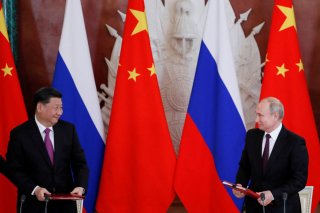China Hedges on Russia’s Invasion of Ukraine
Despite state-led censorship, images of the global anti-war protests have circulated widely on social media.
As Russia’s invasion of Ukraine receives widespread condemnation across the world, China’s government has attempted to remain neutral, avoiding a direct endorsement of the Kremlin’s actions while refusing to participate in sanctions against it and blaming the United States and its Western allies for escalating tensions.
Throughout the first week of the war, some Chinese leaders have implicitly endorsed the Kremlin’s actions, arguing that Russia acted out of security concerns when it attacked its neighbor. A statement released by the Chinese Foreign Ministry last week described the United States as the “culprit” of the war, claiming that it was “hyping” it for its own political interests. Beijing cited the expansion of NATO, which China and Russia have advocated against, as a cause of the crisis in Eastern Europe.
At the same time, however, Beijing and its media affiliates have officially indicated neutrality in the conflict. A Sunday article in China’s state-run Global Times newspaper outlined the government’s position, claiming that Beijing wished to remain neutral to voice its disapproval with Western political and economic measures and to preserve its status as a potential arbiter in future diplomatic efforts.
In a statement, Chinese foreign minister Wang Yi offered a two-sided critique of the conflict, arguing that “the sovereignty and territorial integrity of all countries should be respected” while also stating that “Russia’s legitimate security demands ought to be taken seriously and properly addressed.”
Echoing the Russian line, the Chinese government and state-run media have declined to describe Russia’s entry into Ukraine as an “invasion,” referring to it instead as a “military operation.” A similar line has been enforced on China’s heavily-policed social media outlets, where posts critical of the Kremlin and sympathetic to Ukraine have been taken down.
However, despite state-led censorship, images of the global anti-war protests have circulated widely on Weibo, a Chinese microblogging site roughly akin to Twitter. Chinese citizens have also reacted with amusement to Russia’s extremely limited successes in the first days of the conflict. More overt descriptions of Russia’s invasion as “imperialist aggression” have been censored, as have posts critical of China’s failure to evacuate its nationals from the country prior to the Russian invasion.
The Chinese state-run CTGN network has drawn attention to the plight of Chinese international students in Ukrainian universities, many of whom have been stranded in the country after disruptions to travel from the Russian bombing campaign. The Chinese government had previously urged Chinese citizens in Ukraine to display the Chinese flag on their homes and vehicles to avoid drawing Russian fire.
Trevor Filseth is a current and foreign affairs writer for the National Interest.
Image: Reuters.

